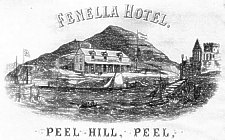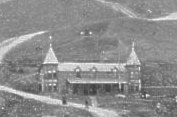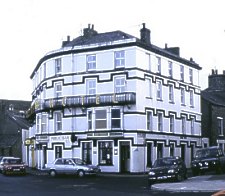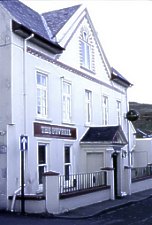Palmer quotes Black's Corner as where the Coastguard House was (on corner of Queen's Road and Shore Road ) — Corris's map of 1784 shows Mr Parr's Brewery on the seaward side of today's Shore Road in front of an open space known as the Plain (approximately where today's Marine Hotel stands). This brewery was washed away in the 1830s though it is not clear it was still operational — certainly associating a public house with the brewery makes sense. Cowley recall's his grandmother (? c.1830) recalling a 'windmill' and a house with steps here.
A Robert Black is shown as holding a licence from 1793 to 1802.
Mathieson considers it became the Liverpool Coffee House (1806 ?) which later transferred to the site now occupied by the Peveril, and the original premises to have been washed away by the sea sometime about 1830.
A Robert Grant is shown as holding a licence from 1802 to 1806, this name is not in the 1810 list (1811-1819 are missing) but it is in 1820-1834 lists (not in 1835 onwards). Robert is found along with wife Nichola Frazier in the 1814 Peel census, the baptisms of three children are found in the German PR (including a George Sutherland Grant born 1803 - possibly named after the erstwhile licencee of the Lord Nelson), there is a burial for a Nichola Frazier in 1816 at Kk Patrick. His move to Douglas might well be signalled by a burial for a Benjamin Grant (age 10) in 1833 at Douglas St George's - he and two daughters are in the 1841 census in Douglas (age given as 58 which is too young for him to have held a licence in 1802) but there is a burial of a Robert Grant aged 77 in Patrick in 1847 which fits better with dates.
The 1831 directory entry is for Market Place which could correspond to Peel Castle (qv) which would tie in with who appears to be the following licensee - Robert Thomas.
1823: Robert Grant, wine & spirit merchant, Caledonian & Liverpool Hotel, Big-street (old name for Castle Street)
1831: R Grant, Caledonian Hotel, Market Place [Oswald's Guide though Peel heading is missing]
1848 plan of Peel (in Leece Museum) shows the Caledonian Inn set back a little from the shore road (indicated as 'New Road') and midway between the two groynes in what later became Barrack Lane - it is shown as being parallel to the sea shore in a position that corresponds to what I believe was the Barracks. The Lord Nelson, described as opposite the Barrack gate may possibly be the building referred to in 1874 as "Phil Qullliam's House".
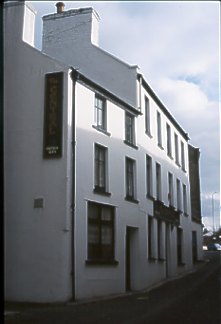
Castle Street
Name modern (post 1894)
Lane by side (now Love Lane) previously known as Cottier's lane, McCormick's lane or Byr Briogh ('Dirty Lane) - if the previous names reflect the hosts of the nearby inn then it probably corresponds to the Manchester (run in 1852 by Cottier) and Wm McCormick and, later, widow Elizabeth who are noted as running an otherwise un-named inn in Big-street from 1861-1881. Current pub comprises two adjacent buildings which, according to George Goodwin, were both pubs - the smaller one was owned by a certain Sloane who operated it as a tavern and barber's shop, whilst the larger was a tavern kept by Sammy Holmes (a Thomas Holmes held a licence from at least 1820 to 1830, and in 1823 was one of only 4 licensees to sell wine - no licence for Sloane can be found). The two houses being merged sometime shortly after 1858. Goodwin also refers to an adjacent liquor shop but cannot recall where this was - this may have been the small pub shown in 1869 as the middle house in Byr Briogh.
First appeared in licence list 1857 when held a wine licence
1857: Thomas Curphey .
1861: Thomas N Curphey
1863: Thomas Curphey
"The Custom House was built on ground on what was Sir George Moore’s bowling green, (see picture painted by John ‘Warwick’ Smith now in the Manx Museum in 1795) which was opposite to the original Marine [i.e. on corner of Castle street and Crown street].
See note on New Inn."
Here I think Mathieson is confused - a new Custom House and Habour Office was indeed built on Moore's Bowling green but not until 1864. That it was built on the site of a pub, 'Winters', is also accepted and it is possible that after the death of Mrs Peate in 1809 it was carried on - the position on the Quay would make it attractive though once the Peveril commenced it would lose trade. The Marine was converted from Sir George Moore's house which on Crown street which faced onto his bowling green.
1852: Wm Johnson, Quay (Slater's directory — note only other hotel was Marine — probably Peel Castle was still being rebuilt)
This was the house set back from Crown Street as it turns into Munn's corner. A James Cowin (possibly father then son) held a licence from 1794 until his widow gave it up c.1835.
1889: Edmund George Boyne
1894: Edward George Boyne
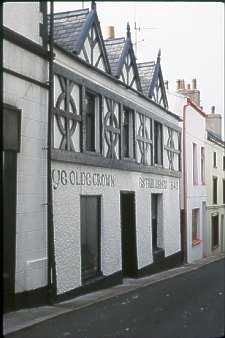
In 1881c No 3 Castle St
"Occupied the large and solid-looking house, now No. 7, on the south side of Castle Street. This is now a private residence" — not clear when name Crown first applied nor justification for date (1643) shown so prominently on the front. Goodwin states that Thomas Green, one time a circus clown (Toney Felix of Blackpool Tower Circus) and 'a noted liar' bought the place c.1901, applied the false wooden decoration to make it appear older and painted the name and date.
1857 lic list - Thomas Quilliam
1861: Thomas Quilliam, Church st (un-named tavern )
1863: Thomas Quilliam, Castle street (un-named tavern)
1881c: Thomas Quilliam (born Patrick) widower age 58 + daughter Catharine
presume same Quilliam who kept the 'old Inn' in Peel and went to Canada a few years prior to 1889 (see Crellin's article on sundial)
1823: Alexander Cumming (Pigot's directory)
First noted as holding licence in 1823 - one of only 4 with a wine licence.
|
|
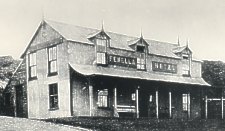 |
|
Burnt down in November 1896
1881c Robert Edward Wright (age 37 born Painswick) + 28 year Irish born wife + 2 children (aged 4 & 1 both born Peel) — in advert described as formerly of L.&N.W., L.C.&D. and Midland Railways, and late Station Master, IoM Railways,Peel
1884: R. E. Wright
1894: John Wood (in newspaper report of fire described as having retired from Cheshire Police Force and living with wife and step-son George Bowden) - he was a retired Inspector Detective - there is an interesting request in the archives at the Masonic Grand Lodge library in London in which he requests a replacement certificate as it was on display in his office and was destroyed along with all other belongings in the fire.
1857: Catherine Creer.
Thomas Long is first noted as holding a licence by 1806 which confirms Goodwin's comment that Long came c.1803., Mathieson notes him as conducting an hotel called the Liverpool Coffee-house from 1809 to 1811 after which he seems to have briefly removed to Douglas(he does not appear to be in the 1814 Peel Census) before returning to Peel c. 1815 (see New Inn) .
1808: (Jefferys Tour): small but most excellent inn, kept by Long. from Carlisle
1811: Thomas Long, Liverpool Coffee House, Peel town (Holden's Directory)
1811 : Wood's tour: [In Peel ] is an excellent but very small inn, kept by Mr. Long from Cumberland.
Mathieson states:
"At the end of the eighteenth century this hotel, not to be confused with the one of the same name in Douglas — was probably the principal one in Peel.
Not only is the position of the Liverpool Coffee House uncertain; its character also is in dispute. Col. Townley, when he visited it, found the hostess sour-tempered and the catering arrangements unusual. The food offered, he records, was ‘chickens or nothing, and even these running about in the yard to be chased into tenderness. ‘ When they came to the table they were uneatable, and had it not been for a large plum-pudding he and his companion would have left the table with empty stomachs.
"Robert Grant opened his Liverpool Coffee House in the year 1820. see note on Caledonian";
however a court case involving a theft from Mr Grant's hotel Peel was tried in January 1820 so he may have opened it a little earlier ?
Anthony McGuffog held a licence 1802-1804 (Manx Advertiser 15 Dec 1804 carries notice for sale of lease of large Dwelling House known as Parr's old house by Anthony McGuffog) - there is a Anthony McGuffog buried in Braddan (MI gives died 13th day February 1810 aged 66 years ) along with a putative son Martin (age 17 bur 26 Oct 1824), his son Robert McGuffog prospered as Collector of Customs for Douglas before his death (bur 6 Jan 1848) age 59 (MI gives died 30th of Dec 1847 aged 59 years - his wife was Margaret Kerr associated with Douglas Soup Kitchen) . There is a Jessie McGuffog noted in the 1814 Peel Census, however there are no marriages/baptisms noted in the IGI (family Presbyterian or Roman Catholic ?). George Sutherland is noted as holding a licence in 1806 but does not appear in the 1814 Peel Census so it would appear he had removed by then
1811: George Sutherland (Nelson's Arms)
1812: Manx Advertiser (22 Feb) George Sutherland, Lord Nelson Hotel — opposite barrack gate.
The Barracks, according to Palmer (Peel One) corresponded to two cottages set well back from Shore Road between College Street and Crown street where a cul-de-sac Barrack Lane (or Boyde's Lane) emerged (site of Barracks now approximately where the new IRIS sewage pumping station is). The Peel Barracks were it seemed built very late in the Napoleonic wars and declared redundant (and sold off) shortly afterwards - they were it seems to the north of Munn's corner and thus a back entrance could come out to the top of Crown street.. Corris's map of 1784 shows a large building and ground close to where Angus Munn built, pre 1807, a double fronted house on Crown St and another abutting it on side facing the sea (thus the corner became known as Munn's corner) - Angus Munn also held a public house licence from at least 1800-1806 The Barracks (and there seems some question as to their position) would appear to be at the rear of these houses with the parade ground in an open space north of the Mathematical School (later used as a shipyard). The 1848 plan of Peel shows the Caledonian hotel on Barrack lane opposite what is probably the one-time barracks..
1852: Ellinor Cottier, Big st
? now Central (qv)
1837 Thomas Crellin, Douglas St - un-named tavern
1841c Thomas Crellin 50, wife Dinah, daughter Mary Ann , ?son John, son William and father Mathias
1851c: Dinah Crellin, widow aged 61, Mary Ann age 24 , William age 17 and grand-daughter Dinah Mason age 9
1852 Daniel Crellin, Douglas st (sic Dinah Crellin )- un-named tavern
1857 Thos Corlett .
1861: Thomas Corlett
1863: John Corlett
Thomas Crellin was a Waterguard (Coastguard) in Ireland (son William born 25 Dec 1833 at Analong Co Down and daughter. Dinah Armstrong (born England). Thomas bur 4 May 1845 aged 54, Mathias 17 March 1851 aged 86, William emigrated to Australia in 1855. Goodwin notes "there was a Crellin 'Mat Moar' (big Mat) who kept in the forties of last century a public house in Douglas Street, Peel (now Corletts)."
| "An hotel once well known in Peel was the MARINE. Originally
the town house of Sir George Moore, S.H.K. (1709-1787), it stood on
the site now occupied by the block of shops at the corner of Castle
Street and Crown Street." Was probably the one used as a residence by Bishop Richmond in 1772 during the extensive repairs made to Bishopscourt at that time. |
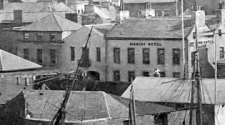 |
Originally opened as Commercial in 1824 (qv) but about 1841 a Mr. Pitchford opened it as the MARINE, under which name it continued until it was destroyed by fire in 1885 .
|
|
The present Marine Hotel, standing on a nearby corner, was built in or about 1890 by Joseph Mylchreest, celebrated as ‘the Diamond King’. This building designed by W .J. Rennison was a modification/rebuild of an existing building, Cleveland House, and some adjacent cottages. |
1847: (Manx Liberal 11 June) E. H. Frissell moved from Peel Castle to Marine
1851c:Edward Frissell, innkeeper, Castle Street
1852: Edward H Frissel, Quay street
1857: Edward H Frissel
1861: H. Branthwaite
1863: Rd Wm Brathwaite
pre 1881: for many years carried on by the late Mrs Greaves
1881c: Jane Clark, widow age 32 born England
1882: Mrs Clark late of the Foxdale Inn, Foxdale
1884: John V. Foy
..note gap until new hotel built (adjacent site) Opened in 1891 with W.F. Marsden from the Peveril
1894: William F Marsden
1843 Solomon Pitchforth (Pigot and Slater’s Directory).
(suspect this is the Marine (qv) — Solomon Pitchforth came from the Mitre in Kirk Michael)
1857 John Kinley (near the Quay).
1861: John Kinley
Back in Peel he opened, on 22nd April, 1816, the New Inn, in a house which had been the residence of Dr. Thomas - a Robert Thomas is shown as briefly holding a licence in 1835 for Peel Castle - ? is the New Inn actually Peel Castle.
In 1818 Long died, leaving the New Inn to be carried on by his widow. In a few months, however, she disposed of it to a certain Capt. W. Norris, who combined the duties of an innkeeper with those of commanding the cutter "Charlotte’ which sailed regularly between Peel and the Irish port of Ardglass.[see Goodwin]
William Norris is noted as holding a licence in 1820 but is not in 1823 list.
"In June 1821 Norris, while retaining the name of his inn removed it to a house of whose location nothing is known beyond the fact that he described it as commanding a beautiful prospect of the Bay and Castle.
In 1824 (after the death of Norris ?) it appears to have become Robt. McKinley’s Commercial Inn (later White Lion and Commercial), and, if this was the case would be the building (now Green’s fish-shop in Bridge Street [corner of Bridge Street & Shore Road]) which is mentioned regularly as the White Lion between 1862 (Leech) and 1885 (L.)."
The item in Manx Sun 15 June 1824 "states in house lately occupied by Mrs Norris".
I think Mathieson is confused in that the Commercial, White Lion and Commercial and Marine are same place with the White Lion (qv) a later and different house some considerable distance away.
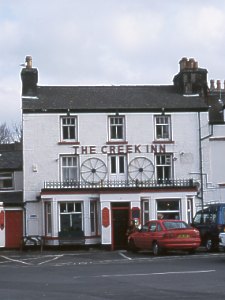
Quay — Oddfellow's presumably refers to the Benefit Society and was a popular name for pubs from the 1840s onwards. Think this was also the Coach and Horses (qv) from 1857. John Teare is first noted as holding licence in 1850 (when held a wine licence)
1852: John Teare
1884: John Taylor [? printer's error]
1889: John Teare
1894: John Teare
In 1907 re-named as The Railway which name it held until around 1964. Now The Creek Inn
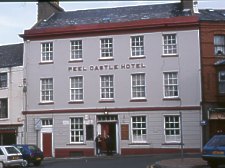
Market Place
"The PEEL CASTLE was open at least as early as 1836, when Welch visited it. It was kept, he says, by ‘a very blooming widow, Mrs. Thomas’ ; and was a very comfortable house, where the charges were moderate and the cooking excellent. The present building is not the one in which he stayed. That was pulled down, and a new one — the one still standing — was opened in October 1845."
Lists of Peel Licensees would suggest that Robert Grant had moved to Peel Castle by the 1830s - his last entry for 1834 (his son Benjamin is buried in Douglas late 1833) and was the only licensee holding a wine licence. In 1835 Robert Thomas is shown as holding a wine licence, his widow appears in 1837, she re-marries Edward Frissell who appears in in the 1840 list - it is likely that Robert Thomas is a son of Dr Thomas whose house it might have been.
As to the rebuild, Frisell moved in 1847 to the Marine (qv); directories do not show the Peel Castle in 1852 thus suggesting a rebuild around this period - it seems rather strange for Frissell to rebuild then immediately move out.
1837: Margaret Thomas (and livery stable keeper and bathing house proprietor) Market place (Pigot's Directory — only Hotel noted in Peel)
1841: Edward Frizelle (Quiggin's Guide — principal hotel)
1843: Edward Frissell (moved 1847 to Marine)
1851c - A Charles Brock (English born) is shown as innkeeper in Market Place - in 1850 a John Brock is noted as holding a PH licence (inc wine) - not in 1846 list nor in 1852 list
1852 --- no mention
1857: Amelia Johnstone
1861: Margt Crelley
1863: Margaret Crelley
1876: William Kelly (late of Ballacraine) (Brown's Guidebook)
1881c William Kelly (born German)
1882: William Kelly (late of Ballacraine Hotel) — stable & yard accommodation for 40 horses and vehicles.
1889: Wm Kelly
1894 Mrs W. Kelly
|
|
"The PEVERIL, probably built about 1730, was the home of Captain
George Savage, chief Customs officer of the town and, from 1794 until
1802, High-Bailiff It became an inn sometime after 1817" - advertised
to be let in Manx Sun 13 Feb 1802. |
Peveril name first appeared c. 1857, probably based on Scott's novel Peveril of the Peak which brought tourists to Peel to see the castle (see also Fenella Hotel named after heroine in same book)
1850 lic list William Clarke
1857: William Clarke, Quay st
1861: William Clarke
1863: Margaret Clark
1881c : William F Marsden (age 35 born England) + wife Mary (6 yr dau born Douglas, 4 year old born Peel)
1884: William F Marsden
1889: Wm Frederick Marsden (moved to Marine (II) in 1891
1894 Cornelius Kay
1882: H. McGlashen (1881c: 23 Glenfaba Rd — Henry McGlashen age 34 born Douglas + English born wife Charlotte, age 39 — it is probable that his father and brothers were living two doors away — if so then the family had moved to Peel in his youth)
1884: A.A. Baker (also ran Ramsey)
1889: James Caley
1894: James Caley
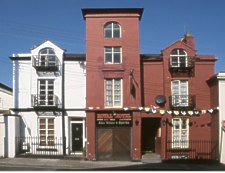
Atholl St was a coaching inn built c.1850s, (the double doors once led to a courtyard), the ground on the opposite side of street (now the bus station/garage built c.1947 on site of old coach house) was where the coaches stabled. Cubbon states that in 1871 John Moffat bought it for £375 from John and Isobel Gell of Port Erin. Also according to Cubbon John Moffat passed it on to son James who leased it to one of the Island breweries whilst he and wife lived on Merseyside.
The front has been altered somewhat, partly by the removal of the iron balconies and by breaking up what was once the top floor dining room french windows which led onto a balcony as well as the separation of the left hand side from its twin.
1857 lic list John Moffat
1861: John Moffat
1863: John Moffat
1881c John Moffat (age 43, born Ireland)
1884: John Moffat
1889: John Moffat
1890: Edmund Miller (in application for licence to Peel Licensing court noted as first application
1894: Mrs Sarah Ann Miller
"was in a large house at the Harbour end of Castle Street, almost opposite the Public Library. Of the two three-storeyed houses, with somewhat lower ones to right and left of them, the Royal Oak is said to have been the one on the right as looked at from the Library entrance. Last mentioned as an inn in 1883 it later became an Alms-house while the very extensive cellars which run beneath it and its neighbours were used as a laundry".
It was actually be better described as an "Old People's Home" and was known from 1907 until closure as the Dale Home ( its change of use was a mechanism to allow the Ward public library to be built)
In 1881 census would appear to be 15 Castle Street though by 1907 it was No. 29
1851: John Andrew (age 33 born German) + wife Mary Ann - judging from age/birth place of children was in Peel from c.1847
1852: John Andrew
1857: John Andrew
1861: Jno Andrew
1863: Jno Andrew
1881c: Patrick Fisher (age 37 born Ireland) + wife Catharine (born Ramsey)
1882: Patrick Fisher
1884: Patrick Fisher
1892: Bought by Samuel Dale
1857 : Ellen Crellin,
1841c Ceasar Taubman (died aged 43 in 1850) innkeeper Sand Street - this I assume is today's Crown Street thus placing the hotel on corner of Castle and Crown streets
1843: Caesar Taubman
1851c: Amelia Taubman, innkeeper, widow age 36 from Ireland - from position would appear to be site now occupied by Ward Library
Last mention 1854 Jefferson’s Directory. Caesar Taubman is first noted as holding licence in 1842 - he died 1850 aged 43.
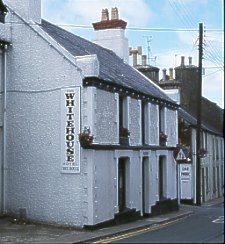
Douglas Street
Formerly Manx Arms (qv). Possibly originally a Farm House (?Cottage, Cubbon states that the farm house was adjacent (demolished and site reused), the 1869 O/S plan shows a large house set back from the road built along the old building line corresponding to the pre-1750 Douglas road (now Rheast Lane), the Whitehouse stands out from this old building line, approximately where the old road would have been before the 1750 direct road was built. The pub was much extended at rear during the 1930s. It is quite possible that the house was built as a pub as would be situated at the entry to the town along the main Douglas Road; certainly it dates post 1750 and was a pub by 1837. The current building shows no indication of ever being thatched (i.e. no slates proud in the chimneys) - possibly dating from the early 19th century ?.
According to Cubbon the name arose from the one-time (18th century) owners of the farm — the White's. However no landlord of this name can be found; however the adjacent house would appear to be known as John White's (or Billy White's) in 1874. The name however most likely relates to the common Manx custom of whitewashing the rendering on buildings.
In 1881 census a Jane Corlett,widow aged 73 (from Ballaugh) is shown as publican with unmarried daughter Jane and grandson John C. Corlett at 7 Tynwald Road (continuation of Douglas Street). This name would tie into the noted landlords for the Manx Arms (qv).
1890: Jane Corlett in application for renewal of licence - no name given for pub except noted 'Douglas St'.
1823: M'Kinley Robert, White Lion Hotel. and Commercial Inn, nr. the Pier - Bridge st and Pier are not close and the address better fits the Marine
McKinley has a 'private' licence in 1820 (think these were for shops) - a public house licence (including wine - 1 of just 4 such establishments) in 1823
Basil Mylrea was first noted in 1830 list of licensees, in which described as a new house - the 1869 OS map shows an Inn (all others are either marked PH or Hotel) at the top end of Bridge Street set behind Christian St. A hand drawn plan of Peel dated 1848 (now in Leece Museum) marks 'White Lion' at this point. The 1864 valuation list shows Mylrea owning and occupying the first house and renting a yard a few houses down - with two houses in course of erection on what might have been the yard. Later Peel Rate Books indicate address as 4 Bridge street
1837: Basil Mylrea, Bridge st (un-named Tavern)
1843: Basil Mylrea, Bridge st (un-named)
1852: Basil Mylrea, Bridge st (un-named)
1857: Basil Mylrea, (White Lion), Bridge st
1861: Bazil Mylrea (White Lion) Bridge st
1863: Basil Mylrea, White Lion, Bridge street
1884: John Quayle, White Lion, Bridge street
